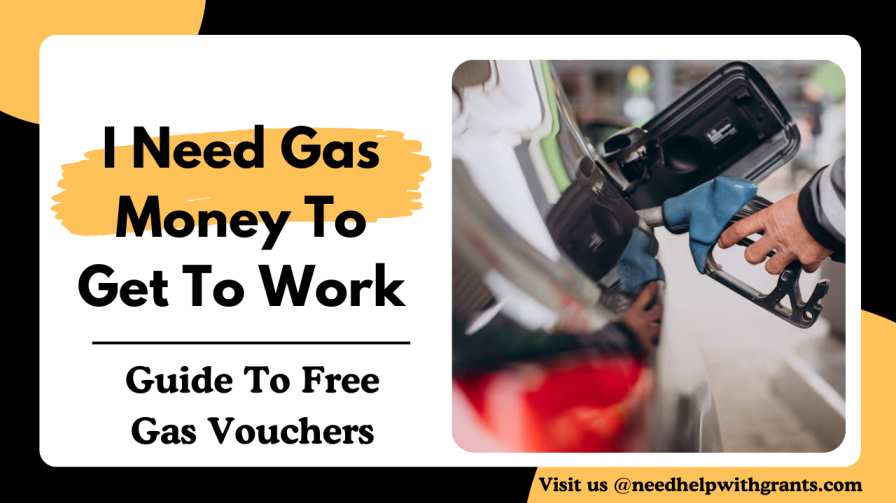Commuting is an important part of everyday life for Americans. Gas costs are an important part of this process, and for some, they become a financial burden that affects their ability to maintain employment. Driving to work is inevitable, but what happens when rising fuel prices make it impossible to fill your tank? In this blog post, we’ll explore practical solutions, employer responsibilities, and community resources to help you get ahead.
You have to drive for a living, but you also have to incur fuel costs. Unfortunately, there is limited legal support for employers, especially for travel expenses. However, there are ways you can explore it.
Key points:
- Free gas voucher programs are mainly for people who are facing a financial crisis and going through difficulties.
- Non-profit organizations, community agencies, or the government help with gas money for people to get to work.
- You need to qualify for the gas vouchers including proof of employment, income level verification, and a demonstration of financial need.
- Apply now for free gas vouchers from local charities, religious institutions, and national non-profits like the Salvation Army, Community action agencies, etc.
4 Ways To Get Free Gas or Transportation To Get Work
Here are the 4 best ways that I discover after researching a lot, that will help you to get free gas or transportation to get to work.
1. Employer-Specific Support Schemes
While there is no legal obligation for employers to provide financial assistance for travel, some companies choose to offer their assistance programs. These can include travel season ticket loans, which allow employees to save money on public transport (trains, tubes, buses, trams, and ferries) by paying in advance for the entire travel period Keep in mind this is a loan it had to compensate for that, but it could reduce the burden in the long run.
2. Mileage Allowance Payments
Discuss paid mileage with your employer if your job involves significant work-related driving. These payments cover the cost of their cars for business-related travel. Employers can pay up to $0.45 per mile for the first 10,000 miles and $0.25 per mile thereafter. While not mandatory, some companies take advantage of tax breaks by offering these fees. You can also claim a tax deduction during this period if you are paid less than the agreed amount.
3. Community Resources
Several organizations and charities assist individuals struggling with gas costs. Here are some options:
a. Free Gas Vouchers
Charities in your area can offer free gas vouchers to qualified individuals who need help with gas money. Even if they don’t specifically offer gas vouchers, they often offer financial assistance for necessities like gas, food, utility bills, housing assistance, etc. Check with local agencies to see if you qualify.
b. Emergency Assistance Program
Some programs provide emergency financial assistance for gas and other basic needs. These tend to be first-come, first-serve, so it’s important to move fast. Look for local resources or government programs that can help bridge the gap during tough times.
4. Carpooling and car sharing
Consider carpooling with co-workers or nearby neighbors. Shared transportation not only reduces fuel costs but also contributes to a greener environment. Alternatively, look for ride-sharing apps that connect you with others heading in the same direction. Splitting gas costs can make a big difference.
How Can I Find Local Charities That Offer Gas Vouchers?
If you’re looking for local charities that offer gas vouchers, here are some options:
- Fuel Bank Foundation: Fuel Bank Foundation provides practical financial assistance and advice to individuals facing fuel crisis. They work with more than 750 partners, including food banks, advisory firms, local authorities, and charities. These trusted organizations recognize people who are struggling to cope and provide support.
- Free Gas, USA: This organization helps low-income individuals by issuing gas cards. They focus on assisting those who qualify financially and need help with gas bills.
- Catholic Charities: Catholic Charities is known for its community outreach programs. Assistance such as gas vouchers are provided to those in need. If you are facing financial difficulties, consider contacting them.
- The Salvation Army: The Salvation Army provides gas vouchers as part of its comprehensive assistance program. Their purpose is to help individuals with emergency needs, including transportation. Contact your local Salvation Army Center or website (https://www.salvationarmyusa.org/usn/) for more information.
- Community food banks and counseling agencies: Many community food banks and counseling agencies partner with organizations such as the Fuel Bank Foundation. They can provide respite and support during difficult times. Contact these local resources and ask about gas vouchers or other assistance.
Remember to ask these organizations directly to understand their specific eligibility criteria and availability. They play a vital role in helping individuals get ahead even when gas prices rise.
What To Do If I Can’t Afford Petrol To Get To Work Each Day?
If you find yourself unable to afford fuel to get to work every day, here are some practical options.
- Discuss with your boss: Talk to your boss about travel concerns. Some companies offer travel season ticket loans, allowing employees to save money on public transportation by paying for the entire travel season in advance. While this cost must be paid, it can provide long-term relief.
- Mileage Allowance Payments: If your job involves significant work-related driving, apply for paid mileage. Employers may pay this fee for employees who use their vehicles for travel. The standard rate is 45p per mile for the first 10,000 miles and 25p per mile thereafter. Although employers are required to pay this fee, they can still get a tax deduction for doing so. You can also claim a tax deduction during this period if you are paid less than the agreed amount.
- Local Charities and Support Programs: Look for local charities and support programs that offer gas vouchers or financial assistance for critical needs. Even if a charity doesn’t issue specific gas vouchers, they often assist with essentials like gas, groceries, utility bills, and housing. Income guidelines usually apply, so check to see if you qualify for assistance in your area.
- Budgeting and Prioritization: Review your overall budget and prioritize necessary funds. Consider allocating more money to gas and reduce unnecessary expenses. Actively track your spending and identify areas where you can save money.
- Carpooling and carsharing: Explore carpooling options with colleagues or nearby neighbors. Car sharing can significantly reduce personal fuel costs. Additionally, consider using ride-sharing services or apps to split costs with others who have similar access options.
- Opting for Public Transportation: While public transportation may not be an option, it is worth exploring all the possibilities. Look for bus routes, trains, or other forms of public transportation that may be more expensive than driving. Sometimes a combination of public transportation and walking can be cost-effective.
- Emergency Assistance: Contact local emergency assistance systems in emergencies. Some organizations provide immediate gas or travel expenses. Keep their contact information handy in case of an emergency.
Ways To Get Free and Discounted Gas 2024
It is possible to get free or discounted gas to get back to work. Here are some ways to get discounted gas in 2024:
1. Gas Reward Plans: Consider participating in gas reward plans offered by various companies. immediately:
- Petro Points: Collect points when you buy fuel at Petro stations. These points can be redeemed for discounts on future gas purchases.
- PC Optimum and Air Miles: These loyalty programs offer points that can be redeemed for gas.
- Credit Cards: Some credit cards offer cash or rewards specifically for gas purchases. See Tangerine, Scotiabank, and KOHO bonds.
2. Energy Price Zones: See energy price zones established by regulators. From July to September 2024, the bill for a typical home that uses electricity and gas (and is paid for by direct debit) will be cut to $1,568 a year, $122 less than before The actual amount you pay on your energy as used depends on, location, and meter type.
3. Local charities and support programs: Look for local charities that offer gas vouchers or financial assistance for essentials. Even if they don’t specifically offer gas vouchers, they often help with needs like gas food, utility bills, and housing.
Remember to evaluate these options to determine what works best for your situation. Gas can be expensive, but there are ways to ease the burden.
Do You Charge Your Employer For Gas Money to Get to Work?
As an employee, you generally do not charge your employer directly for gas bills to get to work. However, there are some important things to consider in this regard:
- Mileage Allowance Payments (MAPs): If you use your vehicle for business, your employer may reimburse you for fuel. These payments are called Mileage Allowance Payments (MAPs).
- Tax relief: If you are paid less than the agreed rate (e.g., your employer pays less than $0.45 per mile), you can claim tax relief during this period. This means that if your actual expenses are less than the approved rate, you can get some tax relief.
- Gas Offers and Taxes: Employers may offer a gas stipend, car allowance, or car allowance as part of compensation. However, these are included in taxable income for employees, unless they are paid as part of a tax-free accounting plan. So, even if you don’t buy gas directly from your employer, you still pay any taxes or rebates.
Conclusion
While high fuel prices present challenges, employer strategies, local resources, and exploring alternative transportation options can help navigate this difficult situation Remember you are not alone, and there are practical solutions. Keep an eye on local support systems and contact your employer to discuss available support.
So, the next time you’re at the pump, know that there are ways to get ahead—even when gas prices seem to be racing ahead.
Feel free to reach out if you have any further questions or need additional information. 😊



